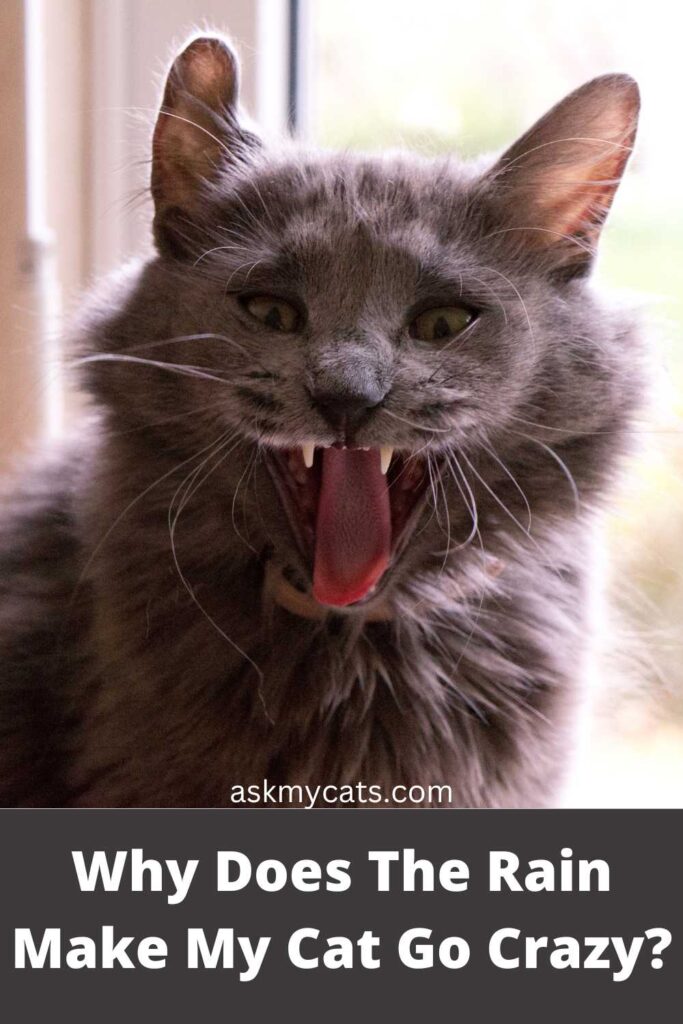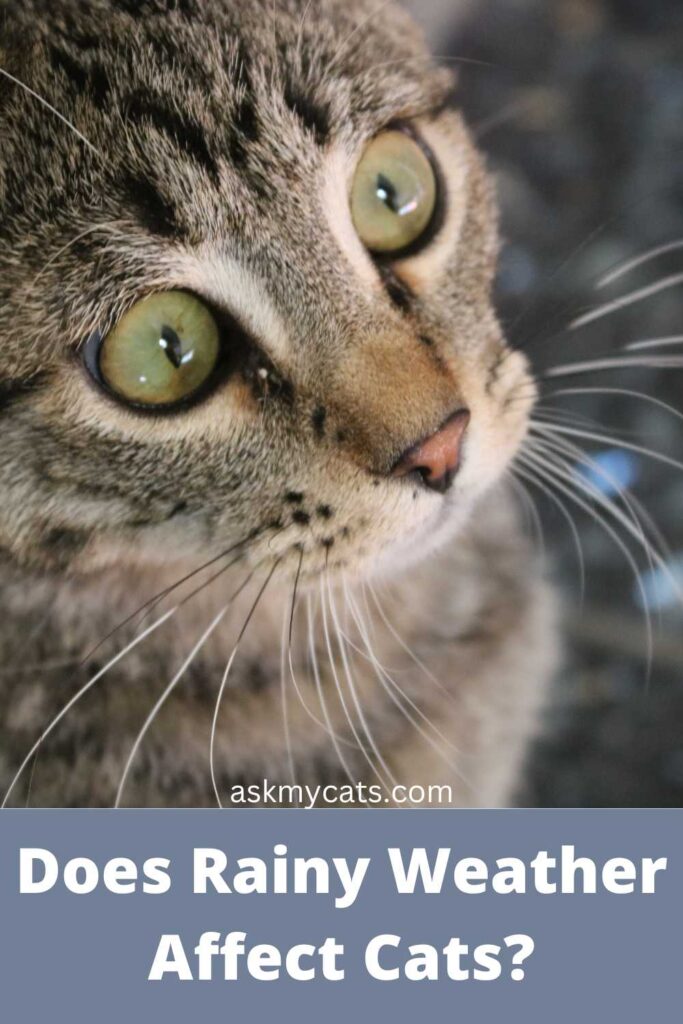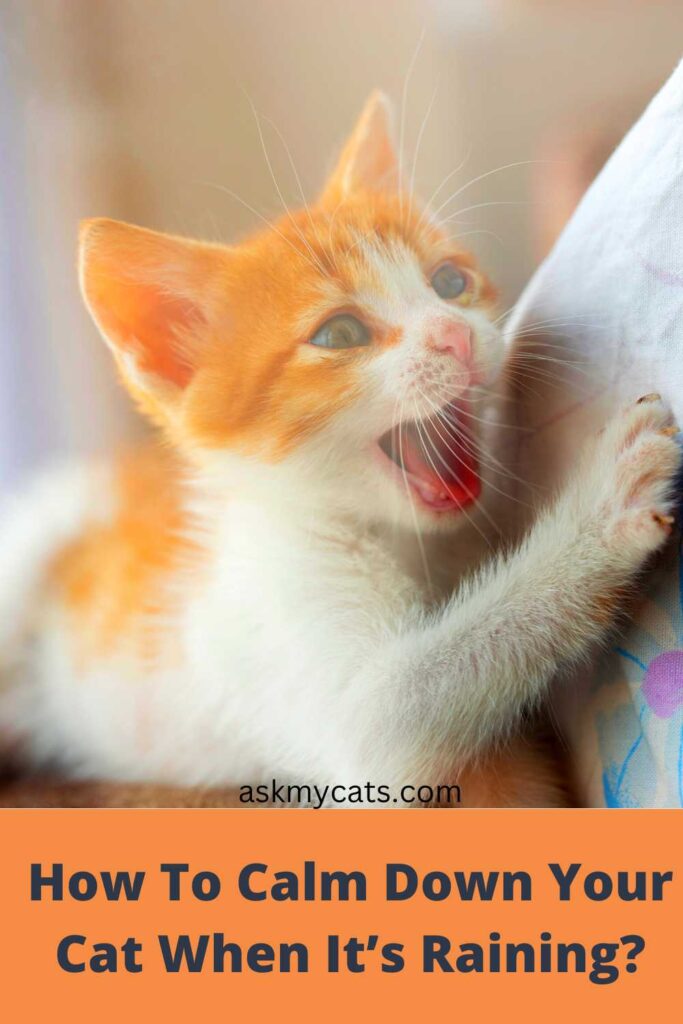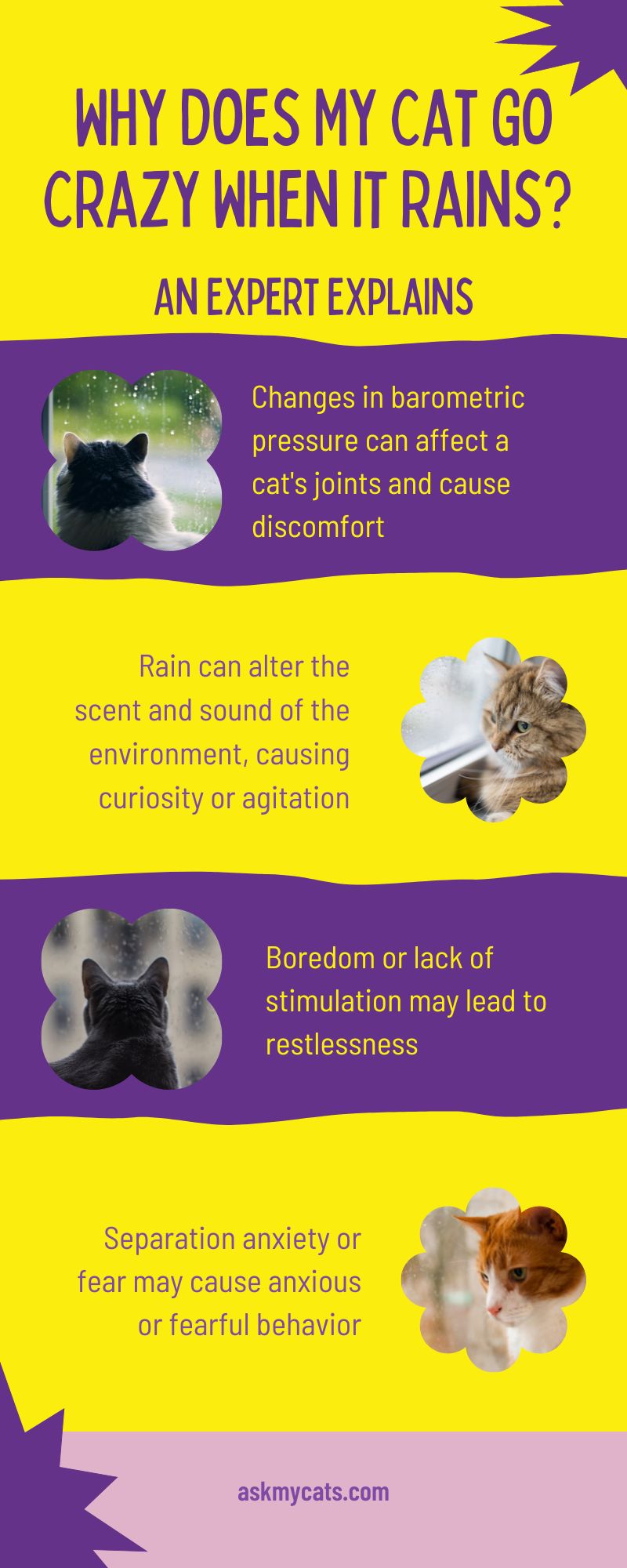So your cat also starts acting like a maniac when it rains? I am glad that my furbabies are not the only ones who exhibit such behavior. But listen, there’s no reason to get concerned about this–it is more common than you think.
Yes, you might have noticed your cat jumping around and hissing more than often but I can assure you that it’s the change in the weather that influenced them to do so.
In this article, we’ll talk about why the rainy season turns a cat into a furry little lunatic to how to calm them down from their panic attack.
Check it out!
Key Takeaways
- Cats may act strangely during the rainy season because they are sensitive to changes in the atmosphere and can hear thunder and lightning more clearly than humans can.
- Cats may also be alarmed by the change in air pressure that occurs before a storm.
- Cats may become scared by the sound of thunder and lightning, and may seek shelter to hide from the storm.
- Rainy weather can make a cat’s coat wet and heavy, impairing its agility and putting its safety at risk.
- Cats generally do not like water, and getting wet can make them uncomfortable.


Give Your Cat the Perfect Day
Get the Free Ebook!
Why Does The Rain Make My Cat Go Crazy?

Do not worry; this is typical and frequently reflects their simple weather-related fear. Imagine hearing thunder but ten times louder—probably that’s what your cat is hearing. Most animals have hearing that is superior to ours and can hear thunder even when we can’t.
Owners of cats are aware that getting caught in the rain can cause even the most well-behaved cats to act in an odd way.
Only two characteristics are the shrill vocalizations and the tense conduct. Many pet owners are curious as to how their pets would fare in the wild.
Do not be alarmed; this is natural and frequently the result of simple fear. Cats might be more sensitive to the extra electricity that a storm introduces to the air.
Cats are coated in hair, which slightly amplifies the small tingling shocks that severe weather can bring. It reminds me of the shock you would experience after rubbing your sock-covered feet across the carpet.
When a storm is coming, the air might feel denser, which could worry your cat. Your cat will have a reason to go to a safe place to hide out for a while even though it may not realize the change is caused by a storm or rain.
How do the noises affect cats?
Cats frequently jump at strange noises. Thunder tends to make them feel uncomfortable. Big booms are frightful and can even cause people to jump, so it makes sense that they might startle animals.
A cat may become afraid of lightning as well, especially if it is striking close by. Cats don’t enjoy vast, open spaces, so they’ll want to hide out till it passes. That implies that as soon as the storm starts or breaks, they will dash to the house.
After the cat runs into the house, it will take some time to calm him down. Consider this your cat’s last chance for survival. It might talk for a while before it tells you everything.
“Changes in barometric pressure can affect a cat’s joints and cause discomfort, which may lead to restless or agitated behavior during rainy weather.”
Dr. Jessica Vogelsang, veterinarian and author
Interesting Read: Do Cats Like Rain?
Possible reasons for cats exhibiting unusual behavior during rainy weather
| Reason | Description |
|---|---|
| Changes in barometric pressure | Some cats may become restless or agitated during rainy weather due to changes in barometric pressure, which can affect their joints and cause discomfort. |
| Changes in scent or sound | Rain can alter the scent and sound of the environment, which may cause a cat to become curious or agitated. |
| Boredom or lack of stimulation | If a cat is bored or lacks sufficient stimulation, it may become restless or exhibit unusual behavior during rainy weather. |
| Separation anxiety or fear | Cats may exhibit anxious or fearful behavior during rainy weather if they are separated from their owners or if they have a negative association with rain. |
Does Rainy Weather Affect Cats?

Yes, rainy weather affects cats in a way they do not like.
There are several reasons why cats don’t enjoy the rain or the water. Rain might make your cat’s coat thicker and cooler, which can make him feel uneasy. If your cat has a thick, particularly wet coat, it could take some time for that wet coat to dry.
The extra weight of a wet coat may impair your cat’s balance. In general, cats are able to jump and move swiftly, but carrying extra weight may make this harder.
In the wild, cats’ agility and reflexes serve as a natural defense, so getting their coats wet can jeopardize their safety.
Storms can be entertaining to observe, but not for a cat. Numerous cats that are treated at LazyPaw Animal Hospitals react severely to the weather, particularly thunderstorms and occasionally even rain.
Some of the feline pals get shaky, meow maniacally, and seek shelter anywhere they can whenever it rains—sometimes even before it rains—under beds, blankets, couches, or cabinets.
“Rain can alter the scent and sound of the environment, which may cause a cat to become curious or agitated. Providing plenty of toys and activities can help keep a cat entertained and prevent boredom during rainy weather.”
Dr. Karen Becker, veterinarian and author
Interesting Read: Where Do Stray Cats Go When It Rains?
How do cats react to rainwater?
Most people are aware that cats hate water, but few know why. Cats’ aversion to water is actually a matter of survival. They don’t have water-resistant fur like many dogs do.
When it becomes wet, it becomes weighted, which makes the cat’s agility and movement more difficult.
Due to this, they are unable to hunt and are unable to better defend themselves against predators. You have a tamed cat, but it still has innate instincts for hunting and defense. House cats dislike wet coats, just like their more untamed predecessors did.
Well, there are always some exceptions: Due to their water-resistant coats, some cat breeds are more suitable for rain than others.
Compared to other cats, breeds including the Maine Coon, Turkish Van, Bengal, and Abyssinian are less afraid of rain and storms.
Must Read: Can Cats Drink Rain Water?
Another reason to fear rainy weather
Rescuers of cats are aware that, like people, animals can occasionally act out of memory. A cat whose former owner abandoned or left it outside in the rain may associate storms with a bad memory.
This might make the cat duck and flee at the first sign of inclement weather. Finding out about an animal’s past is always beneficial, especially if the pet is an adult or older animal. Its past may help you resolve problems and explain much of its behavior.
Interesting Read: Are Cats Scared Of Thunder & Lightning?
How To Calm Down Your Cat When It’s Raining?

Animals can become highly anxious during thunderstorms.
Although cats have long been seen as the more autonomous domestic pet, storms and loud noises can still have an impact on them, even though they don’t pace, whine, or bark like their canine pals do.
Cats might display traits including being too attached, restlessness, or pacing.
Additionally, if your cat seeks out a hiding place to weather the storm, these anxious behaviors might not seem out of the ordinary.
You can try out the following ways to calm down your cat:
1. Keep Your Furbaby Indoor
As a storm approaches, bring your cat inside. If your cat comes to you when you call, this chore will be much simpler! When you are trying to corral your pets before a storm, it really makes a difference.
You might need to lure outside cats inside with treats, food, or tinier jingle bells, in particular. Lock the pet door once everyone has been located to prevent them from being tempted to go back outside.
2. Create A Go-To Spot
Where does your cat typically go to unwind and relax? The most reassuring option for most cats is being able to get to a comfortable place.
Give people a few places to hide, including the space where you spend most of your time.
He or she might be perfectly content to be close to you or might prefer a closet, the space under the bed, or some other quiet retreat. While some cats prefer to curl up in your lap, others might find comfort in a dark, enclosed space.
3. Notice Their Body Language
Watch out for symptoms of anxiety, such as sporadic running, anger, pacing, etc. While some actions are normal, aggressive or destructive conduct needs to be taken seriously.
Cats are also experts at interpreting our body language. Our animals are able to detect our anxiety and respond accordingly. Maintain your composure, and you might even be able to divert them with games.
Interesting Read: Can Cats Find Their Way Home After Rain?
4. Keep An Eye On All Animals.
The tension between cats and other animals is a typical reaction to stressful situations. Some cats experience such extreme terror that they start acting violently toward other cats.
If your animal companion is experiencing this, give them a space where they may feel secure and be apart from the others.
While the others, who were less jarred by the storm, could still access other areas of the house, you might need to put the “problem child” in the area he enjoys the most.
5. It is Her Decision!
Don’t force your cat to come out of hiding or to cuddle with you. These actions just exacerbate your anxiety and increase your risk of receiving cat scratches.
Let your cat choose the location where he or she feels most at ease. Try to maintain a calm and comfortable atmosphere, and remember that after the storm has passed, his behavior will quickly return to normal.
Call your veterinarian or make an appointment if your cat’s behavior does not return to normal.
Interesting Read: Do Cats Sleep More When It Rains?
| Solution | Description |
|---|---|
| Provide a cozy, comfortable environment | Create a warm, comfortable space for your cat to relax during rainy weather, such as a cozy bed or blanket. |
| Offer plenty of toys and activities | Keep your cat entertained with toys, puzzles, and other interactive activities to prevent boredom. |
| Consider using a pheromone diffuser | Pheromone diffusers, such as Feliway, can help calm and relax your cat by releasing synthetic feline pheromones into the air. |
| Consult with a veterinarian or a behaviorist | If your cat’s behavior during rainy weather is causing concern, consider consulting with a veterinarian or a certified animal behaviorist for further guidance and support. |
Frequently Asked Questions
Is it okay for my cat to drink rainwater?
Only rainwater that is collected directly from the sky and in an area with a low degree of pollution would be suitable for cats to drink.
You should only let your cat drink rainfall that falls directly from the skies. If it touches the ground or your roof, it must be strictly regarded as polluting.
When they dislike the water, the bowl, or the position of the bowl, cats prefer to drink dirty water. Where they hunt, cats in the wild will not drink. The dead animals would contaminate the water and harm the cat.
Final Words

If you want her to stay close to you during storms, you can consider buying her a comfortable, partially enclosed cave-style bed.
There isn’t really anything wrong with allowing your cat a little privacy to wait out the storm if she feels secure and at ease in a small area.
Speak to your veterinarian about possible treatments if the anxiety is still intolerable.
Let us know in the comments section if your cat acts normally or crazily when it rains. How do you deal with it?
Interesting Read: Why Is My Cat Sitting Outside In The Rain?
References
- https://lazypawvet.com/blog/2016/02/07/why-is-my-cat-scared-of-rain/
- https://sites.psu.edu/gracesibleyrcl/2020/03/26/astraphobia-the-fear-of-thunder-and-lightning-thunderstorms/
- https://www.sanantonio.gov/Animal-Care/Resources/Blog/ArtMID/25403/ArticleID/18764/Six-tips-you-can-use-to-calm-ANXIOUS-dogs-during-thunderstorms
